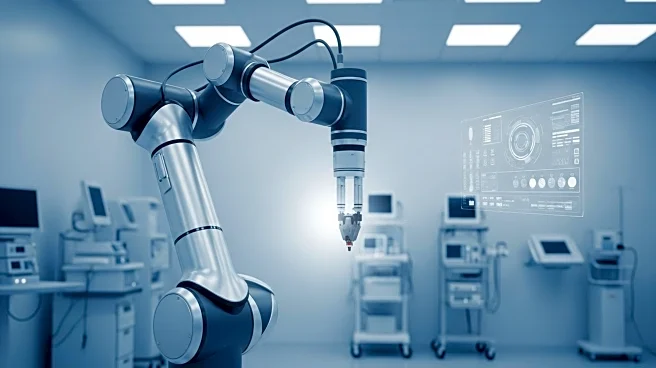What is the story about?
What's Happening?
Healthcare organizations are increasingly adopting an automation-first mindset to improve operations and integrate artificial intelligence (AI) into their workflows. This approach involves prioritizing automation in every initiative, from administrative tasks to clinical documentation and electronic health record (EHR) management. The shift aims to optimize operations, reduce manual data entry, and enhance patient engagement. By leveraging AI and automation, healthcare providers can streamline processes, reduce costs, and improve patient outcomes. The transition requires overcoming technical and cultural barriers, with a focus on thoughtful strategy and planning. Organizations are encouraged to start with non-clinical areas where regulations are less stringent, gradually expanding automation to more complex tasks.
Why It's Important?
The adoption of an automation-first mindset in healthcare is significant as it promises to transform the industry by making operations more agile and efficient. By reducing manual intervention, healthcare providers can allocate more time to patient care, potentially improving patient satisfaction and outcomes. Automation can also help alleviate clinician burnout by minimizing tedious tasks, thus enhancing workforce productivity. Furthermore, integrating AI into healthcare systems can lead to cost savings and better resource management, addressing long-standing challenges in the industry. As healthcare costs continue to rise, automation offers a viable solution to bend the cost curve while maintaining high-quality care.
What's Next?
Healthcare organizations are expected to continue expanding their automation initiatives, focusing on areas that offer high rewards with minimal risk. The next phase involves implementing automation in systems that handle more abstract tasks, requiring less human intervention. Organizations will need to carefully assess which processes can be automated, considering regulatory requirements and data privacy concerns. As automation becomes more prevalent, healthcare providers will likely explore new opportunities for innovation, potentially leading to advancements in patient care and operational efficiency. Stakeholders, including IT professionals and senior leadership, will play a crucial role in driving this transformation.
Beyond the Headlines
The shift towards an automation-first mindset in healthcare raises ethical and legal considerations, particularly regarding data privacy and the use of AI in clinical settings. Ensuring that sensitive patient information is protected while leveraging AI for operational improvements is a critical challenge. Additionally, the cultural shift required to embrace automation may face resistance from staff accustomed to traditional workflows. Overcoming these barriers will require education, encouragement, and a thoughtful roadmap for implementation. Long-term, the integration of AI and automation could lead to a fundamental change in how healthcare services are delivered, potentially reshaping the industry.
















